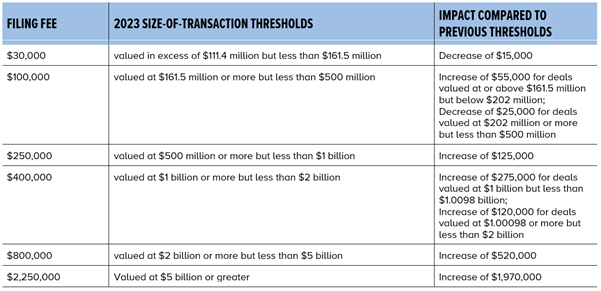

Jump to...
The new Hart-Scott-Rodino Antitrust Improvements Act of 1976, as amended (the “HSR Act”) thresholds will go into effect on February 27, 2023 and will apply to all transactions closing on or after that date. As previewed in our client alert on December 30, 2022, under the Merger Filing Fee Modernization Act, three additional tiers of filing fees will go into effect on February 27, 2023, for a total of six tiers.[1] Notably, the highest filing fee threshold, which applies to transactions valued at $5 billion or more, will increase from $280,000 to $2.25 million.
The thresholds for interlocking directorates under Section 8 of the Clayton Act were also increased, and the new thresholds went into effect on January 20, 2023. Potentially unlawful interlocking directorates have emerged as an enforcement priority in recent months.[2]
Generally, HSR notifications are required for an acquisition of voting securities, non-corporate interests or assets when the transaction reaches a certain threshold (the “size of transaction” test) and the parties are of sufficient size (the “size of parties” test). The size of transaction test is adjusted annually based on changes in the gross national product for the preceding year. The new size of transaction threshold will be $111.4 million, an increase of approximately $10 million from the previous threshold of $101 million.
Under the new 2023 thresholds that will take effect on February 27, 2023:
To determine HSR reportability for transactions that are likely to close on or around the new threshold effective date, parties must look to the size of transaction threshold that will be in effect on the closing date.
The new thresholds are also used to determine the applicability of certain exemptions under the HSR Act and Rules.
The 2023 filing fee structure includes three additional tiers of fees.[3]

To properly determine the requisite HSR filing fee, the acquirer must determine the transaction’s value and the corresponding filing fee threshold that is in effect at the time of filing.
Finally, the FTC also has revised the maximum civil penalty for HSR Act violations. Such maximum civil penalties, which are effective as of January 11, 2023, will increase from $46,517 per day to $50,120 per day. These new penalty levels apply to civil penalties assessed after January 11, 2023, including civil penalties whose associated violation predated the effective date. These adjustments do not retrospectively change previously assessed or enforced civil penalties that the FTC is actively collecting or has collected.
The FTC also revised the dollar amount thresholds for evaluating interlocking directorates under Section 8 of the Clayton Act. Under certain circumstances, Section 8 prohibits one person from serving as a director or officer of two competing corporations if each corporation has capital, surplus and undivided profits aggregating more than $45,257,000 with an exception if the competitive sales of either corporation are less than a de minimis threshold of $4,525,700, the competitive sales of either corporation are less than 2% of that corporation’s total sales, or the competitive sales of each corporation are less than 4% of that corporation’s total sales. The aggregate capital, surplus and undivided profits of each corporation at the end of its last full fiscal year controls for Section 8 purposes. These new Section 8 thresholds went into effect on January 20, 2023.
[1] Ben Gris et al., Significant US HSR Filing Fee Changes Under the Merger Filing Fee Modernization Act, Shearman & Sterling: Perspectives (Dec. 30, 2022), https://www.shearman.com/en/perspectives/2022/12/significant-us-hsr-filing-fee-changes-undermerger-filing-fee-modernization-act
[2] David Higbee et al., DOJ’s first Large Scale Crackdown on Potentially Unlawful Interlocking Directories Led to 7 Board Resignations Across 5 Companies, Shearman & Sterling: Perspectives (Oct. 24, 2022), https://www.shearman.com/en/perspectives/2022/10/doj-crackdown-on-unlawful-interlocking-directorates-led-to-7-resignations-across-5-tech-companies.
[3] Gris, supra note 1.
Practices
Regional Experience